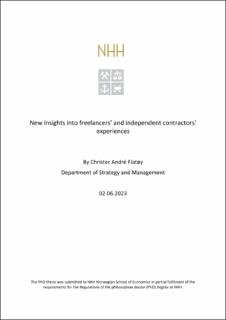New Insights into Freelancers' and Independent Contractors' Experiences
Abstract
This PhD thesis provides new insights into freelancers’ and independent contractors’
experiences. This group of workers has increasing relevance to companies and organization
scholars. Many countries have seen significant growth in their numbers, and we can expect this
to continue. These workers are also theoretically interesting because their work arrangement
differs substantially from those of employees. However, current organization theories have
primarily been developed from studies of employees and have them at their centre, while
organization scholars are yet to fully acknowledge freelancers’ and independent contractors’
increasing relevance and theoretical uniqueness. As organization scholars, we are therefore
currently less capable of describing the experiences of freelancers than what is called for,
considering their increasing relevance and theoretical uniqueness.
I aim to help fill this gap in the literature on freelancing and independent contracting.
To achieve this, I have gathered qualitative and quantitative primary data and conducted three
studies, all of which are oriented towards describing some of the experiences of freelancers and
independent contractors. The foci of Studies 1, 2, and 3 are, respectively, contract managers’
on-the-job challenges, freelance journalists’ professional identification, and freelance
journalists’ work–life balance. The first study, which is of a qualitative nature, uses an
exploratory research design. In Studies 2 and 3, which are of a quantitative nature, I compare
freelancers’ experiences with those of employees.
Through these three studies, this PhD thesis offers several contributions to the literature
on freelancing and independent contracting. Viewing contract managers’ experiences in light
of the inherent theoretical tension between independent contracting and management, the first
study provides new insights into the relational and operational challenges that contract
managers experience. Building on insights rooted in social identity theory, the second study
improves our understanding of how freelancers view themselves as professionals. Through
contrasting a resource perspective with a ‘stress of higher status’ perspective, the third study
enhances our understanding of freelancers’ work–life balance.
Regarding empirical contributions, this thesis contains two quantitative studies that
compare freelancers’ and employees’ experiences. This is an important contribution to the
extant literature on freelancers’ experiences, which is predominantly of a qualitative nature and
without empirical comparisons. More, by sampling from contract managers and journalists, this
thesis sheds light on the experiences of a group of workers that have received limited scholarly
attention to date. Sampling from these occupations is also beneficial for theory development.
